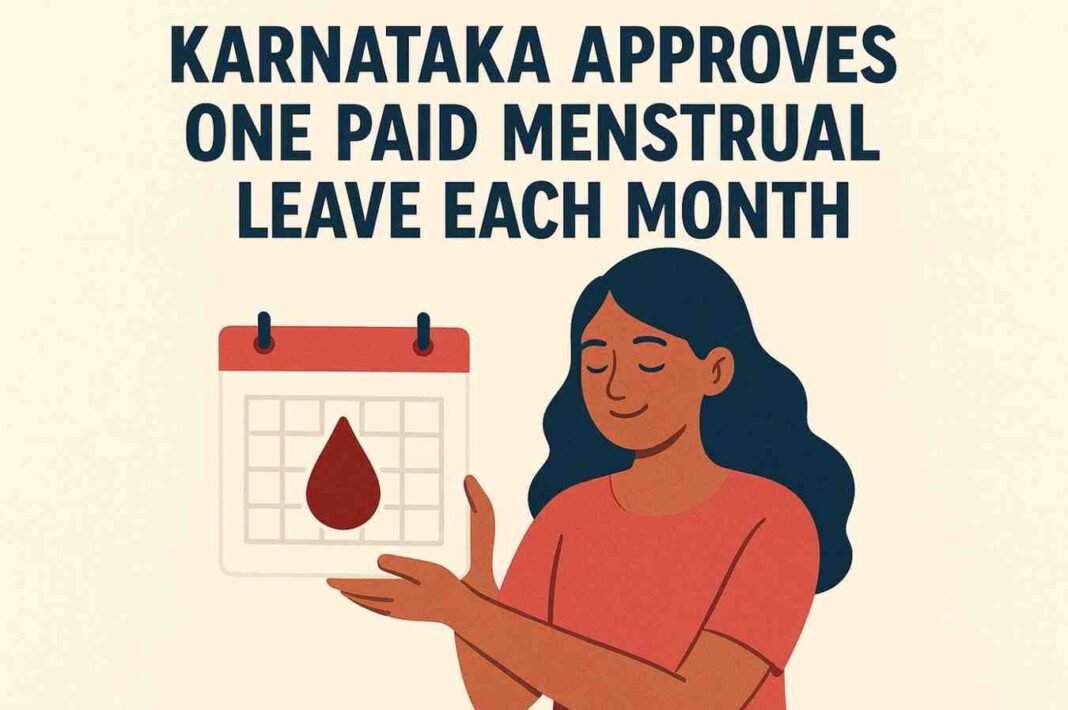Karnataka Government Introduces Paid Menstrual Leave Policy
In a significant step towards promoting gender-sensitive workplace policies, the Karnataka Cabinet has approved a proposal granting women employees one paid menstrual leave per month. The announcement was made following a cabinet meeting on Thursday, where officials emphasised the state’s commitment to ensuring women’s physical and mental well-being while fostering an inclusive and supportive work environment.
According to the cabinet note, the decision applies to women employed across government departments, public sector undertakings, and private organisations, including multinational companies, IT firms, and garment industries. By implementing this reform, Karnataka becomes one of the few Indian states to formally recognise menstrual health as an integral aspect of workplace wellness.
A Progressive Step for Working Women
State Law Minister H K Patil, while briefing reporters after the cabinet meeting, described the move as both “necessary and progressive.” He said, “This decision will be helpful to women employees. Similar policies have worked well in other states, and we have chosen to adopt this model for Karnataka.”
The government’s decision, Patil noted, stems from growing awareness about the challenges faced by women during menstruation—especially in demanding work environments. The leave aims to provide women the flexibility to take time off when required without the fear of losing pay or being penalised.
Building on National Momentum
With this decision, Karnataka joins Bihar, Odisha, Kerala, and Sikkim in offering menstrual leave to working women. These states have already implemented similar policies in the public sector, setting a precedent for inclusive workplace reform.
The central government has also been discussing the possibility of a national framework for menstrual leave, but no uniform policy has yet been introduced. In the meantime, several private companies across India have voluntarily adopted menstrual leave policies, acknowledging the importance of employee health and gender inclusivity.
Among those leading the change are Zomato, Swiggy, Byju’s, Larsen & Toubro (L&T), and digital agency Gozoop. These organisations have integrated menstrual leave into their HR frameworks, normalising conversations around menstruation and workplace equality.
Encouraging Corporate and Social Inclusion
Welcoming the Karnataka government’s move, women’s rights activist Brinda Adige called it a “commendable step toward recognising the genuine health needs of women in the workplace.” She highlighted that such institutional support strengthens the foundation for gender equity and sustainable development.
“By institutionalising menstrual leave across government and organised private sectors, Karnataka is affirming that women’s well-being is central to inclusive growth,” Adige said. “Although challenges remain in reaching the informal workforce, this initiative sets a precedent for broader health empowerment and improved participation of women in the economy.”
Promoting Health Awareness and Reducing Stigma
Beyond workplace benefits, the Karnataka government views the policy as an opportunity to spread awareness about menstrual health and hygiene. The cabinet note stated that the initiative aims to “ensure both physical and mental comfort for women employees” and to “encourage a culture that openly addresses menstrual health without stigma or embarrassment.”
Experts believe that by institutionalising menstrual leave, the government not only addresses a critical health issue but also helps reduce absenteeism caused by unreported health discomforts. This could lead to improved productivity and morale among women employees in both public and private sectors.
A Step Toward Inclusive State Growth
The Karnataka government’s menstrual leave policy represents a shift in workplace welfare thinking—moving from traditional leave structures toward more empathetic and health-conscious practices. By acknowledging menstruation as a legitimate reason for paid leave, the state recognises the physiological realities women face and sets a new benchmark for gender-sensitive governance.
While implementation guidelines are expected to be released soon, the initiative has already drawn widespread praise from social organisations and industry leaders. As India continues to advance conversations around workplace equality, Karnataka’s decision is likely to inspire other states and companies to follow suit, paving the way for a more inclusive and compassionate workforce across the nation.







